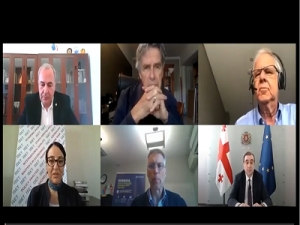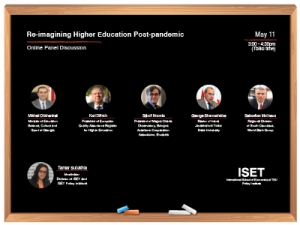ISET Director speaks at UN Georgia event dedicated to UN Day
On 24 October, Tamar Sulukhia, Director of ISET’s Policy Institute, participated in a panel discussion at an event hosted by the United Nations. This discussion covered numerous critical topics, such as creating decent jobs within the inclusive labor market, the importance of ensuring effective decentralization, etc.
The panel discussion was a part of an event, “From Economic Growth to Universal Prosperity: Post-Sustainable Development Goals Summit and Vision for the Future”, organized by the UN to celebrate United Nations Day on 24 October.
The discussions included in the event covered the various economic and social issues associated with decentralization at the national and local levels and the key aspects of maintaining decent jobs and an inclusive labor market.
ISET Director speaks at World Bank Event
On 18 October, Tamar Sulukhia, Director of the ISET Policy Institute, took part in a panel discussion dedicated to the launch of the Systemic Country Diagnostic (SCD) Update for Georgia during an event organized by the World Bank. The report, entitled “Georgia: Keeping the Reform Momentum”, provides a comprehensive analysis of the developmental challenges and opportunities that the country requires to accelerate progress toward a reduction in poverty alongside shared prosperity in a sustainable manner.
At the event, the panel speakers discussed topics including increasing labor force participation; improving access to finance, digitalization, and innovation; investing in energy efficiency; supporting renewable energy development; and enhancing the enforcement and predictability of laws and regulations.
The study itself was developed based on consultations with various representatives from the Georgian government, the private sector, development partners, civil society organizations, and academia.
ISET brings together experts in second discussion panel, hosts high-level discussion on higher education post-pandemic
May 11 saw the second discussion in ISET's ongoing series of international policy online panels which examine the possible socio-economic effects of the COVID-19 pandemic. The second panel was dedicated to what the higher education sector will look like when the pandemic is declared to be over.
Hosted and moderated once again by Dr. Tamar Sulukhia, ISET's Director, the distinguished panel was composed of Dr. Mikheil Chkheneli, the Georgian Minister of Education; Dr. Sebastian Molineus, the Regional Director of the South Caucasus for the World Bank; Karl Dittrich, President of European Quality Assurance Register for Higher Education; Dr. Sijbolt Noorda, President of the Magna Charta Observatory; and Dr. George Shavrashidze, Rector of Tbilisi State University.
Re-imagining Higher Education Post-pandemic
International School of Economics at TSU (ISET) and ISET Policy Institute are holding second in the series of international Policy Panels – Re-imagining Higher Education Post-pandemic. It will focus on impacts of COVID-19 on the higher education sector globally and will bring together top expert views on the longer-term prospects and challenges for the universities and students. How financial, economic and demographic pressures impact demand, enrollment and mobility in higher education? How will post-pandemic socio-economic outlook reflect on funding, institutional traditions, academic programs and sustainability of colleges and universities? Will higher education be able to re-invent itself and push the frontier forward?
Join ISET to discuss these and many other issues with our distinguished Panelists:
ISET hosts online discussion with Georgian government & World Bank representatives
Although the operations of many businesses and organizations have been brought to a crashing halt due to the ongoing COVID-19 pandemic, ISET has refused to allow the crisis to hinder its work. Over the last few months, all teaching and academic activity have been shifted online using Zoom, a format which works equally well for operations of ISET Policy Institute and its efforts to serve as a knowledge accumulation and exchange platform in the lock-down. The online high-level Policy Panel Discussion on April 21 on 'Perspectives of Post-COVID-19 Recovery: Views from the World Regions' well served this objective.
CONTACT US
16, Zandukeli St,
0108 Tbilisi,
Georgia
Telephone: (+995 32) 250 71 77
Email: info@iset.ge






